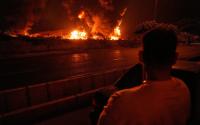4 February 2005
The Government-sponsored conference on climate change, which concluded in Exeter yesterday, was a success. It demonstrated, beyond doubt, that global warming is one of the gravest threats facing our world today. The conference also confirmed that the overwhelming majority of independent scientists are of the opinion that we must drastically reduce our carbon emissions if we are to avoid disaster. The idea that the rapid heating up of the Earth is nothing to do with our reckless use of energy was given short shrift by this distinguished gathering.
Tony Blair now has solid scientific ammunition when he attempts to persuade the G8 governments of the need to step up the international response to the threat of climate change. President Bush, in his State of the Union speech on Wednesday, again showed little sign that he is prepared to revise his dangerously complacent attitude. The difficulty of convincing America of the need to curb emissions remains the biggest obstacle to progress - and the Prime Minister's success will be a test of the worth of his celebrated "special relationship" with Mr Bush.
But Mr Blair has no room for complacency either. The EU emissions-trading scheme, the centrepiece of his climate policy, needs to be tightened up. And more ought to be done to encourage oil companies to utilise carbon sequestration - in which liquid carbon dioxide is pumped from coal-fired power stations into empty oil wells - including tax incentives.
The idea of giving tax incentives to a company such as Shell - which yesterday announced unprecedented profits and has a dubious environmental record - will strike many as perverse. But oil companies are commercial entities - and although Shell made £9bn profit in 2004, most of it overseas, it will also pay £6bn in tax to the British Exchequer. If some of that money could be channelled into emission-reducing technology, we would all benefit.
This week's conference has emphasised the daunting scale of the problems that are in store if the earth continues to heat up at this rate. The task for the world's politicians is to do something about it. And quickly.






